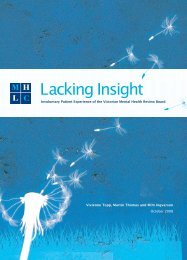Reducing Ethnic Profiling in the European Union - Open Society ...
Reducing Ethnic Profiling in the European Union - Open Society ...
Reducing Ethnic Profiling in the European Union - Open Society ...
- No tags were found...
You also want an ePaper? Increase the reach of your titles
YUMPU automatically turns print PDFs into web optimized ePapers that Google loves.
compla<strong>in</strong>ts commissions that <strong>in</strong>clude both police and expert (judges, lawyers, etc.) civilianmembers. The first phase of <strong>the</strong> compla<strong>in</strong>ts procedure is <strong>in</strong>ternal: <strong>the</strong> compla<strong>in</strong>t ismade to <strong>the</strong> law enforcement agency and processed by that agency through mediation.In cases <strong>in</strong> which <strong>the</strong> matter rema<strong>in</strong>s unresolved, <strong>the</strong> compla<strong>in</strong>t is passed to <strong>the</strong> externalmembers of <strong>the</strong> commission. The effectiveness of this process reportedly varies. It hasbeen proposed that such <strong>in</strong>vestigations should be automatic ra<strong>the</strong>r than discretionary<strong>in</strong> any case <strong>in</strong> which discrim<strong>in</strong>ation is alleged.Some review bodies may undertake self-<strong>in</strong>itiated <strong>in</strong>vestigations of issues of concernthat come to <strong>the</strong>ir attention. O<strong>the</strong>r bodies can only <strong>in</strong>vestigate <strong>in</strong>dividual compla<strong>in</strong>tsand, <strong>in</strong> some cases, may analyze cases for patterns of abuse of discrim<strong>in</strong>ationand recommend changes <strong>in</strong> policy or practice to address <strong>the</strong>m. The United K<strong>in</strong>gdomIndependent Police Compla<strong>in</strong>ts Commission has undertaken several studies of ethnicprofil<strong>in</strong>g issues as described <strong>in</strong> <strong>the</strong> case study that follows.UNITED KINGDOMIndependent Police Compla<strong>in</strong>ts Commission (IPCC)Most compla<strong>in</strong>ts about stops and searches <strong>in</strong> <strong>the</strong> UK are made directly to localpolice stations and handled through <strong>in</strong>formal local mediation between <strong>the</strong> policeand <strong>the</strong> compla<strong>in</strong>ant. The IPCC handles appeals <strong>in</strong> cases where compla<strong>in</strong>ants arenot satisfied, or more serious allegations of discrim<strong>in</strong>atory use of police power or useof force. In addition, <strong>the</strong> IPCC has conducted wider <strong>in</strong>vestigations <strong>in</strong>to <strong>the</strong> systemicuse of stop-and-search tactics.In 2007, <strong>the</strong> IPCC <strong>in</strong>vestigated <strong>the</strong> use of section 60 stop-and-search powers whichallow police officers to stop <strong>in</strong>dividuals without reasonable suspicion “<strong>in</strong> anticipationof violence” <strong>in</strong> <strong>the</strong> West Midlands, respond<strong>in</strong>g to a compla<strong>in</strong>t and evidence ofsystemic misuse of <strong>the</strong> power. Based on an analysis of stop data, <strong>in</strong>ternal authorizationsfor operations, <strong>in</strong>telligence brief<strong>in</strong>gs, <strong>in</strong>-depth <strong>in</strong>terviews police officersand community representatives, and comparisons with o<strong>the</strong>r forces and areas withsimilar crime problems, <strong>the</strong> IPCC found that section 60 was be<strong>in</strong>g used <strong>in</strong>appropriatelyto deal with rout<strong>in</strong>e crime problems with no justifiable reason why normal policepowers were not be<strong>in</strong>g used.In 2009, <strong>the</strong> IPCC released a policy position giv<strong>in</strong>g guidance to police forces on <strong>the</strong>proper use of <strong>the</strong>ir stop-and-search powers, and establish<strong>in</strong>g standards by whichstop-and-search compla<strong>in</strong>ts should be judged. 115 The IPCC recognized that “<strong>the</strong> useof stop and search powers are highly <strong>in</strong>trusive and may risk seriously underm<strong>in</strong><strong>in</strong>g58 OVERSIGHT BODIES AND COMPLAINTS MECHANISMS
















